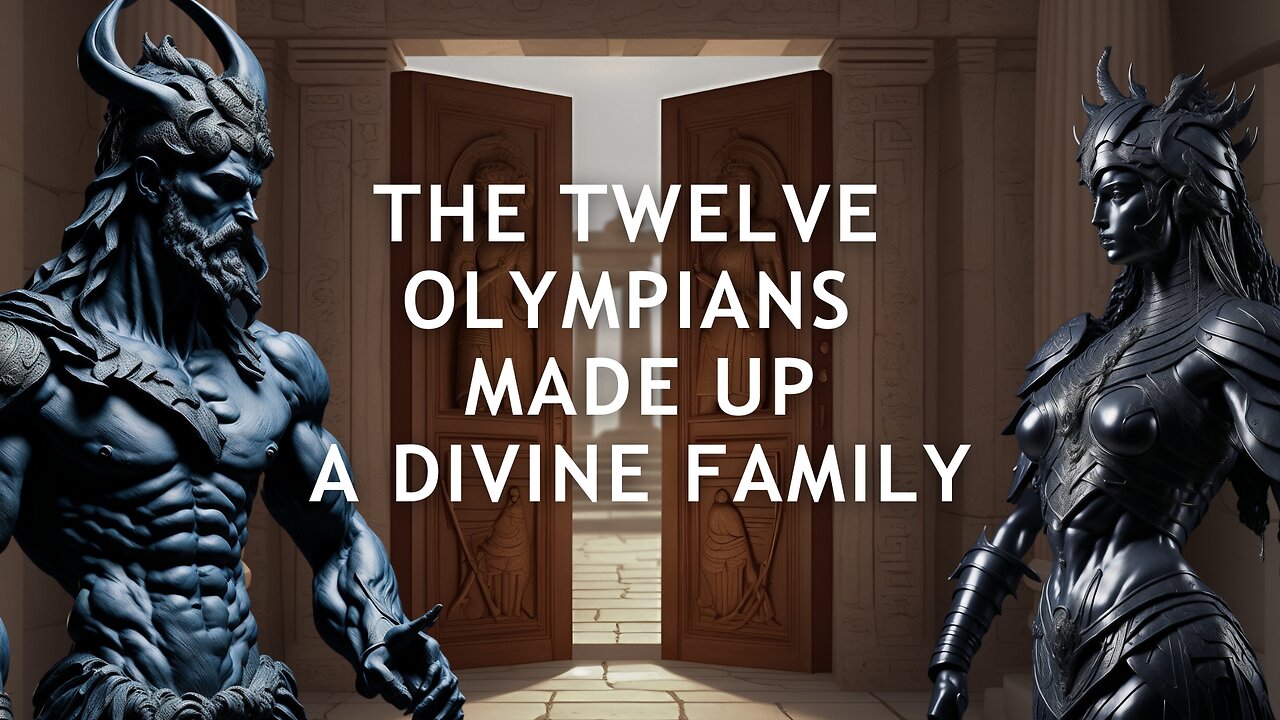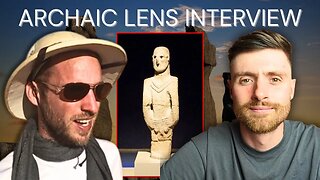Premium Only Content

Greek Mythology: The Twelve Olympians Made Up A Divine Family
Greek Mythology: The Twelve Olympians Made Up a Divine Family
#greekmythology #greekgods #mythology
From Mythology: Timeless Tales of Gods & Heroes
by Edith Hamilton
00:08 Zeus
Zeus and his brothers drew lots for their share of the universe. The sea fell to Poseidon and the underworld to Hades. Zeus became the supreme ruler. He was lord of the sky, the rain god, and the cloud gatherer who wielded the awful thunderbolt. His power was greater than that of all the other divinities together.
02:52 Hera
She was Zeus's wife and sister. The Titans Ocean and Tethys brought her up. She was the protector of marriage, and married women were her peculiar care. She was venerated in every home. She was the goddess married women turned to for help.
04:41 Poseidon
He was the ruler of the sea, Zeus's brother, and second only to him in eminence. The Greeks on both sides of the Aegean were seamen and the god of the sea was all important to them. Poseidon had a splendid palace beneath the sea, but he was oftener to be found in Olympus.
06:00 Hades
He was the third brother among the Olympians who drew for his share the underworld and the rule over the dead. He was also called Pluto, the god of wealth, of the precious metals hidden in the earth. He had a far-famed cap or helmet which made whoever wore it invisible. It was rare that he left his dark realm to visit Olympus or the Earth, nor was he urged to do so. His wife was Persephone (Proserpine) whom he carried away from the earth and made queen of the lower world.
06:57 Pallas Athena
She was the daughter of Zeus alone. No mother bore her. Full-grown and in full armor, she sprang from his head. In the earliest account of her, the Iliad, she's a fierce and ruthless battle goddess. But elsewhere she is warlike only to defend the state and the home from outside enemies. She was Zeus's favorite child. He trusted her to carry the awful aegis, his buckler, and his devastating weapon, the thunderbolt.
08:09 Phoebus Apollo
The son of Zeus and Leto (Latona), born in the little island of Delos. He has been called “the most Greek of all the gods.” He is a beautiful figure in Greek poetry, the master musician who delights Olympus as he plays on his golden lyre; the lord, too, of the silver bow, the archer-god, far-shooting; the Healer, as well, who first taught men the healing art. He is the god of light, in whom is no darkness at all, and so he is the god of truth.
11:28 Artemis
Apollo's twin sister, daughter of Zeus and Leto. She was one of the three maiden goddesses of Olympus. She was the Lady of Wild Things, huntsman-in-chief to the gods, an odd office for a woman. Like a good huntsman, she was careful to preserve the young; she was “the protectress of dewy youth” everywhere.
14:16 Aphrodite
The goddess of love and beauty who beguiled all gods and men alike; the laughter-loving goddess who laughed sweetly or mockingly at those her wiles had conquered; the irresistible goddess who stole away even the wits of the wise. She is the daughter of Zeus and Dione in the Iliad, but in the later poems she has said to have sprung from the foam of the sea, and her name was explained as meaning “the foam-risen.” Aphros is foam in Greek.
16:33 Hermes
Zeus was his father and Maia, daughter of Atlas, his mother. Because of a very popular statue, his appearance is more familiar to us than that of any other god. He was graceful and swift of motion. On his feet were winged sandals; wings were on his low-crowned hat, too, and on his magic wand, the Caduceus. He was Zeus's messenger who “flies as fleet as thought to do his bidding.”
17:55 Ares
The god of war, son of Zeus and Hera, both of whom Homer says, detested him. Indeed, he is hateful throughout the Iliad, poem of war though it is. Occasionally the heroes “rejoice in the delight of Ares’ battle,” but far oftener in having escaped “the fury of the ruthless god.” Homer calls him murderous, blood stained, the incarnate curse of mortals; and strangely, a coward. Yet he has a train of attendance on the battlefield which should inspire anyone with confidence.
20:05 Hephaestus
The god of fire, sometimes said to be the son of Zeus and Hera, sometimes of Hera alone, who bore him in retaliation for Zeus’s having brought forth Athena. He was a kindly, peace-loving god, popular on earth as in heaven. With Athena, he was important in the life of the city. The two were the patrons of handicrafts, the arts which along with agriculture are the support of civilization; he the protector of the smiths as she of the weavers.
22:13 Hestia
She was Zeus’s sister, and like Athena and Artemis a virgin goddess. She has no distinct personality and she plays no part in the myths. She was the Goddess of the Hearth, the symbol of the home, around which the newborn child must be carried before it could be received into the family. Every meal began and ended with an offering to her.
Human written copy, AI generated voice and images, Introvert creator
-
 LIVE
LIVE
Nerdrotic
1 hour agoWe Stand Behind Sydney Sweeney | Naked Gun | Fantastic Flop? - Friday Night Tights 365
1,136 watching -
 LIVE
LIVE
Dr Disrespect
4 hours ago🔴LIVE - DR DISRESPECT - STREAMING UNTIL I GET A 25 KILL GAME
6,196 watching -
 LIVE
LIVE
Akademiks
5 hours agoShannon Sharpe FIRED. KSOO Found Guilty! Gilbert Arenas ARRESTED! NBA Youngboy 14th kid OTW. 1/30
1,103 watching -
 2:09:16
2:09:16
Tucker Carlson
4 hours agoCandace Owens: Macron, Harvey Weinstein, and Why “Christ Is King” Totally Broke People’s Brains
82.2K160 -
 55:15
55:15
Michael Button
6 hours ago $0.13 earnedWhy Does This Ancient Symbol Appear Everywhere? - Archaic Lens Interview
1551 -
 2:03:12
2:03:12
Side Scrollers Podcast
5 hours agoBlabs is Absolutely DISGUSTED By Nintendo | Side Scrollers Live
13.2K4 -
 10:40
10:40
MTNTOUGH Podcast w/ Dustin Diefenderfer
6 hours agoBack with the 75th Ranger Regiment: MTNTOUGH Dives Deeper into America's Elite
75 -
 DVR
DVR
SportsPicks
4 hours agoCrick's Corner: Episode 57
864 -
 59:32
59:32
Sean Unpaved
4 hours agoNasty Boy Unleashed: World Series Champ Rob Dibble Unloads on the MLB & Trade Deadline
24.3K -
 1:46:15
1:46:15
Lara Logan
14 hours agoLAWFARE UNDER FIRE: Treniss Evans Leading the Charge Against a Weaponized Justice System | Ep 29
17.2K1